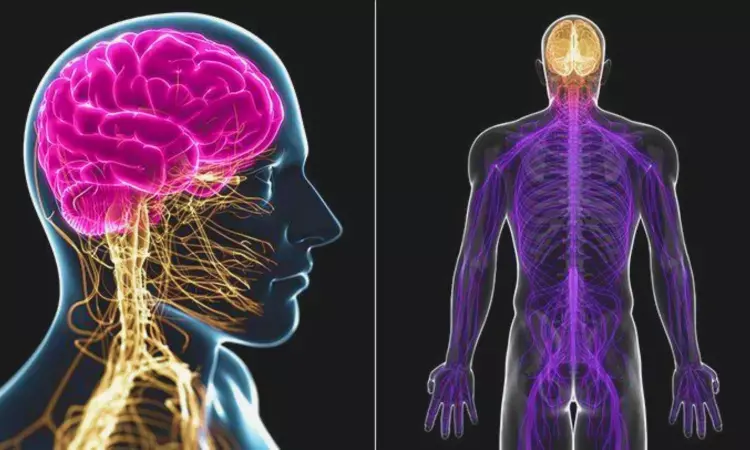- Home
- Medical news & Guidelines
- Anesthesiology
- Cardiology and CTVS
- Critical Care
- Dentistry
- Dermatology
- Diabetes and Endocrinology
- ENT
- Gastroenterology
- Medicine
- Nephrology
- Neurology
- Obstretics-Gynaecology
- Oncology
- Ophthalmology
- Orthopaedics
- Pediatrics-Neonatology
- Psychiatry
- Pulmonology
- Radiology
- Surgery
- Urology
- Laboratory Medicine
- Diet
- Nursing
- Paramedical
- Physiotherapy
- Health news
- Fact Check
- Bone Health Fact Check
- Brain Health Fact Check
- Cancer Related Fact Check
- Child Care Fact Check
- Dental and oral health fact check
- Diabetes and metabolic health fact check
- Diet and Nutrition Fact Check
- Eye and ENT Care Fact Check
- Fitness fact check
- Gut health fact check
- Heart health fact check
- Kidney health fact check
- Medical education fact check
- Men's health fact check
- Respiratory fact check
- Skin and hair care fact check
- Vaccine and Immunization fact check
- Women's health fact check
- AYUSH
- State News
- Andaman and Nicobar Islands
- Andhra Pradesh
- Arunachal Pradesh
- Assam
- Bihar
- Chandigarh
- Chattisgarh
- Dadra and Nagar Haveli
- Daman and Diu
- Delhi
- Goa
- Gujarat
- Haryana
- Himachal Pradesh
- Jammu & Kashmir
- Jharkhand
- Karnataka
- Kerala
- Ladakh
- Lakshadweep
- Madhya Pradesh
- Maharashtra
- Manipur
- Meghalaya
- Mizoram
- Nagaland
- Odisha
- Puducherry
- Punjab
- Rajasthan
- Sikkim
- Tamil Nadu
- Telangana
- Tripura
- Uttar Pradesh
- Uttrakhand
- West Bengal
- Medical Education
- Industry
Psoriasis and Psoriatic Arthritis Linked to Higher Risk of Polyneuropathy Due to Contributing Factors: Study

Italy: Psoriasis and psoriatic arthritis are associated with a higher risk of polyneuropathy, which appears to stem from a greater prevalence of contributing factors rather than a direct increase in neuropathy risk linked specifically to these conditions, a recent study has found.
Understanding the prevalence and clinical characteristics of peripheral neuropathy in patients with psoriasis or psoriatic arthritis could enhance our knowledge of the underlying pathogenetic mechanisms, potentially allowing for targeted diagnostic and therapeutic strategies and improving prognostic accuracy," the researchers wrote in Muscle & Nerve.
Clinical and laboratory data indicate a link between neurologically mediated inflammation and psoriasis. However, the risk factors and characteristics of peripheral neuropathy in psoriasis and psoriatic arthritis are still not fully understood. To fill this knowledge gap, Pietro E. Doneddu, Neuromuscular and Neuroimmunology Unit, IRCCS Humanitas Research Hospital, Milan, Italy, and colleagues aimed to evaluate the risk and to describe the features of peripheral neuropathy in patients with psoriasis and psoriatic arthritis.
For this purpose, the researchers consecutively enrolled one hundred patients with psoriasis and/or psoriatic arthritis and 100 control subjects. Diagnostic confirmation included skin biopsy, electrophysiological examination, and nerve ultrasound for confirmed polyneuropathy.
The research team included patients with psoriasis and psoriatic arthritis, some of whom receive treatments like anti-tumor necrosis factor (TNF) α agents, to thoroughly evaluate their risk of developing peripheral neuropathy. These patients are also prone to comorbidities such as diabetes and cancer, which can further elevate their risk.
Control subjects comprised individuals without psoriasis or psoriatic arthritis who attended the dermatology clinic for mole mapping and were enrolled in the study consecutively. None of the controls had melanoma or other neoplastic skin lesions.
Both patients and controls underwent extensive assessments, including detailed medical histories and neurological evaluations conducted by neurologists specializing in peripheral neuropathies.
The study led to the following findings:
- Nine patients were diagnosed with confirmed polyneuropathy, while none of the control subjects had the condition (relative risk [RR] = 19.00).
- Specific relative risks for polyneuropathy were 22.09 in psoriasis patients and 18.75 in psoriatic arthritis patients.
- The observed polyneuropathy in all nine patients was length-dependent, symmetrical, and predominantly sensory, with minimal or no disability.
- Comorbidities and exposure to therapies known to increase the risk of polyneuropathy were more frequent in psoriasis and/or psoriatic arthritis patients compared to controls (42% versus 4%).
- Analyzing data after excluding possible contributory causes, the risk of polyneuropathy in patients with psoriasis and/or psoriatic arthritis was not significant.
"If validated by further research, polyneuropathy should be recognized as a potential comorbidity linked to psoriasis and psoriatic arthritis," the researchers concluded. "Additionally, our study indicates that psoriasis and psoriatic arthritis do not appear to be associated with an increased risk of nerve entrapments."
Reference:
Doneddu, P. E., Borroni, R., Ceribelli, A., Carta, F., Sechi, M., Moretti, G. S., Giordano, A., Scheveger, F., Moret, F., Fernandes, M., Gentile, F., Valenti, M., Luciano, N., Bianchi, E., Costanzo, A., De Nittis, P. E., Selmi, C., & Nobile-Orazio, E. Risk of peripheral neuropathy in patients with psoriasis and psoriatic arthritis. A prospective cohort study. Muscle & Nerve. https://doi.org/10.1002/mus.28196
Dr Kamal Kant Kohli-MBBS, DTCD- a chest specialist with more than 30 years of practice and a flair for writing clinical articles, Dr Kamal Kant Kohli joined Medical Dialogues as a Chief Editor of Medical News. Besides writing articles, as an editor, he proofreads and verifies all the medical content published on Medical Dialogues including those coming from journals, studies,medical conferences,guidelines etc. Email: drkohli@medicaldialogues.in. Contact no. 011-43720751


